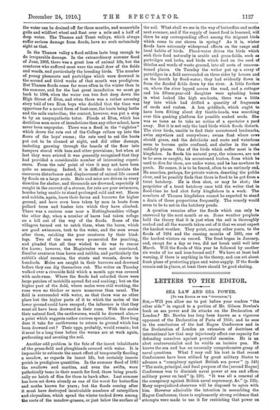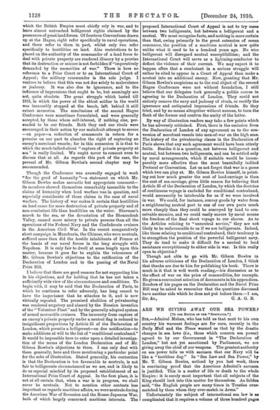LETTERS TO THE EDITOR.
SEA LAW AND SEA POWER.
[TO THA EDITOR or TH1 " SPECTATOIL.1 SIR,—Will you allow me to put before your readers "the other side" in regard to a portion of Mr. Gibson Bowles's book on sea power and its attacks on the Declaration of London P Mr. Bowles has long been known as a vigorous opponent of the Declaration of Paris of 1856; and he sees in the conclusions of the last Hague Conference and in the Declaration of London an extension of doctrines of international law that may injuriously affect our capacity for defending ourselves against powerful enemies. He is an alert controversialist and he wields an incisive pen. He knows the sea and has an unusually comprehensive grasp of naval questions. What I may call his text is that recent Conferences have been utilised by great military States to advance a "conspiracy against British sea power" (p. 145) " The main, principal, and final purpose of the [second Hague] Conference was to diminish naval power at sea and affirm military power on land" (p. 120). "It was all a renewal of the conspiracy against British naval supremacy, &c." (p. 135). Many unprejudiced observers will be disposed to agree with him. However admirable the intention in assembling the Hague Conference, there is unpleasantly strong evidence that attempts were made to use it for restricting that power on
which the British Empire must chiefly rely in war, and to leave almost untouched belligerent rights claimed by the possessors of great land forces. Of fourteen Conventions drawn up at the Hague, eight refer specifically to naval operations, and three refer to them in part, whilst only two refer specifically to hostilities on land. Also restrictions to be placed on the authority of the commander of a land force to deal with private property are rendered illusory by a proviso that its destruction or seizure is not forbidden if "imperatively demanded by the necessities of war." There is here no reference to a Prize Court or to an International Court of Appeal ; the military commander is the sole judge. I venture to believe that this was not due solely to malevolence or jealousy. It was also due to ignorance, and to the influence of impressions that ought to be, but seemingly are not, quite obsolete. The great struggle which lasted till 1815, in which the power of the ablest soldier in the world was inexorably stopped at the beach, left behind it still extant memories. The conclusions of the second Hague Conference were sometimes formulated, and were generally accepted, by those whom self-interest, if nothing else, per- suaded to be our friends. Both they and our rivals were encouraged in their action by our maladroit attempt to secure —on paper—a reduction of armaments in return for a promise on our part to abandon the right of capturing an enemy's merchant vessels ; for in this connexion it is that to which the much-talked-about " capture of private property at sea " is really limited. We ought never to consent even to discuss that at all. As regards this part of the case, the perusal of Mr. Gibson Bowles's second chapter may be recommended.
Though the Conference was avowedly engaged in work "for the good of humanity "—a statement on which Mr. Gibson Bowles makes sarcastic but appropriate comment— its members showed themselves remarkably insensible to the claims of humanity when land warfare was in question, and especially considerate of those claims in the case of naval warfare. The history of war makes it certain that hostilities on land cause far more destruction of private property and of non-combatant life than hostilities on the water. Sherman's march to the sea, or the devastation of the Shenandoah Valley, caused more misery to private persons than all the operations of the Federal Navy and the Confederate cruisers in the American Civil War. In the recent comparatively short campaign in Manchuria, the Chinese, who were neutrals, suffered more than did the hostile inhabitants of France at the hands of our naval forces in the long struggle with Napoleon. It is only fair to dwell at some length upon this matter, because it goes far to explain the vehemence of Mr. Gibson Bowles's objections to the ratification of the Declaration of London and to the passing of the Naval Prize Bill.
I believe that there are good reasons for not supporting him in his objections, and for holding that he has not taken a sufficiently wide view of the circumstances and conditions. To begin with, it may be said that the Declaration of Paris, to which be continues to refer adversely, has long ceased to have the importance that he attaches to it, and is now virtually repealed. The promised abolition of privateering was rendered nugatory and absurd by the Russian invention of the " Volunteer Fleet" and by the generally adopted system of armed mercantile cruisers. The immunity from capture of an enemy's private property under a neutral flag is reduced to insignificant proportions by Article 25 of the Declaration of London, which permits a belligerent—on due notification—to make additions at will to the list of " conditional contraband." It would be impossible here to enter upon a detailed investiga- tion of the terms of the London Declaration and of Mr. Gibson Bowles's objections to them. I can only deal with them generally, here and there mentioning a particular point for the sake of illustration. Stated generally, his contention is that the Declaration is too favourable to neutrals, is not fair to belligerents circumstanced as we are, and is likely to do us especial mischief by its proposed establishment of an International Prize Court of Appeal. In the first place, it is not at all certain that, when a war is in progress, we shall never be neutrals. Not to mention other contests less important as regards maritime affairs, we were neutrals during the American War of Secession and the Russo-Japanese War, both of which largely concerned maritime interests. The
proposed International Court of Appeal is not to try cases between two belligerents, but between a belligerent and a neutral. We must recognise facts, and nothing is more certain than that, owing primarily to the great extension of ocean commerce, the position of a maritime neutral is now quite unlike what it used to be a hundred years ago. No wise belligerent will disregard neutral susceptibilities ; and the International Court will serve as a lightning-conductor to deflect the violence of their current. We may expect it to happen often that a combatant in a serious struggle will rather be cited to appear in a Court of Appeal than make a neutral into an additional enemy. Now, granting that Mr. Gibson Bowles's suspicions as to the real object of the second Hague Conference were not without foundation, I still believe that our delegates took generally a politic course in agreeing to the Declaration of London. They could not entirely remove the envy and jealousy of rivals, or rectify the ignorance and antiquated impressions of friends. So they tried, and by no means altogether without success, to turn the flank of the former and confirm the amity of the latter.
By way of illustration readers may take a few points which he has adversely criticised. First, there is the omission from the Declaration of London of any agreement as to the con- version of merchant vessels into men-of-war on the high seas. The history of the privateering clause in the Declaration of Paris shows that any such agreement would have been utterly futile. Besides it is a question, not between belligerent and neutral, but between two belligerents, and can be settled only by naval arrangements, which if suitable would be incom- parably more effective than the most beautifully indited Protocol or Convention. Let us not forget that war is a game which two can play at. Mr. Gibson Bowles himself, in point-. ing out how much greater the cost of land-carriage is than the cost of sea-carriage, gives little reason for believing that Article 35 of the Declaration of London, by which the doctrine of continuous voyage is excluded for conditional contraband, would necessarily be intolerable for us if we were involved in war. We could, for instance, convey goods by water from a neighbouring neutral port to one of our own ports much more cheaply than they could be conveyed by land to con- ceivable enemies, and we could easily ensure by naval means the freedom of the final short voyage to our shores. As to the Articles relating to "unneutral service," they are not likely to be unfavourable to us if we are belligerents. Indeed, like those relating to conditional contraband, their tendency is to strengthen the position of the powerful belligerent navy. They do tend to make it difficult for a neutral to lend assistance surreptitiously to either side in war. Is this really open to objection ?
Though not able to go with Mr. Gibson Bowles in his adverse criticisms of the Declaration of London, I think that thanks are due to him for publishing his book. There is much in it that is well worth reading,.—his discussion as to the effect of war on the price of commodities, for example. He gives a convenient selection of documents in his appendices. Readers of his pages on the Declaration and the Naval Prize Bill may be asked to remember that the questions discussed have another side which he does not put before them.—I am,







































 Previous page
Previous page